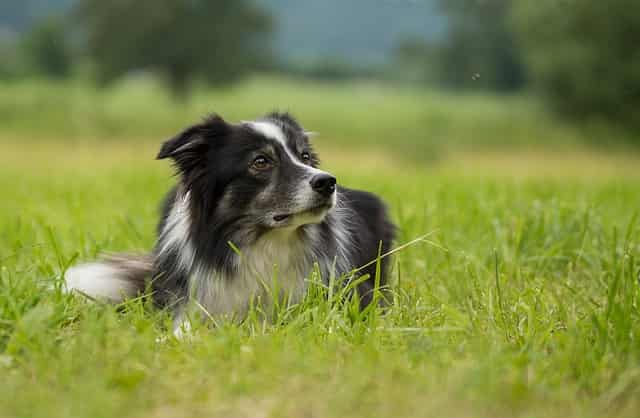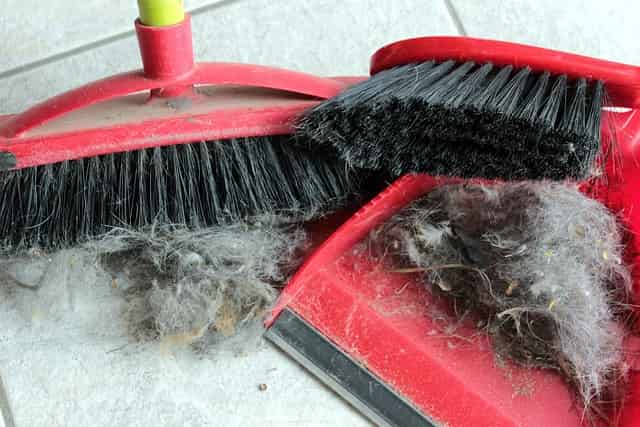
For individuals with allergies, owning a dog can be a challenge. Many people wonder if Border Collies are hypoallergenic, meaning they produce fewer allergens and are less likely to cause an allergic reaction.
Unfortunately, Border Collies are not considered hypoallergenic. They have a thick double coat that sheds frequently, which can cause allergies to flare up in sensitive individuals. While no dog breed is completely hypoallergenic, some breeds are better suited for people with allergies than others. It is important to note that allergies can vary from person to person, and some people may be more sensitive to certain breeds than others.
Hypoallergenic Dogs
Here is a list of hypoallergenic dog breeds:
- Poodle
- Bichon Frise
- Portuguese Water Dog
- Soft Coated Wheaten Terrier
- Maltese
- Schnauzer (Miniature, Standard, and Giant)
- Yorkshire Terrier
- Shih Tzu
- Havanese
- Kerry Blue Terrier
- Chinese Crested
- Afghan Hound
- Basenji
- Bedlington Terrier
- Irish Water Spaniel
It’s important to note that while these breeds are considered hypoallergenic, no dog is completely allergen-free. People with allergies should spend time with the dog they are considering adopting to see if they have a reaction. Additionally, regular grooming and cleaning can help reduce allergens in the home.
Overview of Border Collies
Border Collies are a breed of working dogs that are known for their intelligence, agility, and obedience. They were originally bred for herding sheep in the border region between England and Scotland, hence their name. Today, they are popular pets and are used in a variety of working roles, including search and rescue, therapy, and agility competitions.
Appearance
Border Collies are medium-sized dogs that typically weigh between 30 and 55 pounds. They have a distinctive coat that is usually black and white, but can also be red and white, blue and white, or tricolored. Their coat is thick and requires regular grooming to prevent matting and tangling.
Temperament
Border Collies are highly intelligent and energetic dogs that require a lot of exercise and mental stimulation. They are known for their loyalty and affection towards their owners, but can be reserved towards strangers. They are also highly trainable and excel in obedience and agility competitions.
Border Collies are not considered to be hypoallergenic. They shed moderately and require regular grooming, which can help to reduce the amount of dander and hair that they produce. However, they are not recommended for people with severe allergies to dogs.
Overall, Border Collies are a popular breed of working dogs that are known for their intelligence, agility, and obedience. They have a distinctive coat and require regular grooming to maintain their appearance. While they are not considered to be hypoallergenic, they are suitable for people with mild allergies to dogs.
Understanding Hypoallergenic Dogs
What Does Hypoallergenic Mean?
When we talk about hypoallergenic dogs, we are referring to dogs that are less likely to cause allergic reactions in humans. This does not mean that they are completely allergen-free, but rather that they produce fewer allergens than other breeds.
Allergens are substances that cause allergic reactions in humans. In the case of dogs, allergens can come from a variety of sources, including their fur, dander, and saliva. Some breeds produce more allergens than others, and this is where the term hypoallergenic comes in.

Factors That Affect Hypoallergenicity
There are several factors that can affect a dog’s hypoallergenicity. One of the most important is shedding. Dogs that shed a lot of fur are more likely to produce allergens, as the allergens can become airborne and spread throughout the home. Breeds that shed less, such as Poodles and Bichon Frises, are often considered more hypoallergenic.
Another factor is the amount of dander that a dog produces. Dander is made up of tiny flakes of skin that are shed by dogs and can also contain allergens. Breeds that produce less dander, such as the Basenji and the Portuguese Water Dog, are often considered more hypoallergenic.
It’s also important to note that allergens are not just found in a dog’s fur and dander. They can also be found in a dog’s saliva and urine. Breeds that drool a lot, such as the Saint Bernard, may be more likely to cause allergic reactions in humans.
In conclusion, while no dog breed is completely hypoallergenic, some breeds are less likely to cause allergic reactions than others. If you or someone in your household suffers from pet allergies, it’s important to do your research and choose a breed that is compatible with your needs.
Border Collies and Allergies
Border Collie Coat and Allergens
Border Collies have a double coat, which means they shed quite a bit. The undercoat is soft and dense, while the outer coat is coarser and longer. This combination of hair types can trap allergens, such as pollen, dust, and dander, making it difficult for allergy sufferers to be around them.
While Border Collies are not considered hypoallergenic dogs, they are not known to produce excessive amounts of dander, which is the primary allergen that dogs produce. However, people with severe allergies may still experience symptoms around Border Collies.
Grooming Border Collies to Reduce Allergens
Grooming your Border Collie can help reduce allergens in your home. Regular brushing and combing can help remove loose hair, dirt, and dander from their coat. Bathing your Border Collie once a month can also help reduce allergens.
When grooming your Border Collie, it is essential to use the right tools. A slicker brush can help remove loose hair and dirt, while a metal comb can help remove tangles and mats. You may also want to consider using an air purifier in your home to help reduce allergens.

Managing Allergies Around Border Collies
If you or someone in your household suffers from allergies, you may be wondering if a Border Collie is a good fit for your family. While no dog breed is completely hypoallergenic, there are steps you can take to manage allergies around your Border Collie.
Cleaning Up After Your Border Collie
One of the most important steps in managing allergies around your Border Collie is to keep a clean home. Regularly vacuuming your carpets and using a HEPA air purifier can help reduce allergens in the air. It’s also important to bathe your Border Collie regularly with a mild shampoo to reduce dander and other allergens on their coat.
Reducing Allergens in Your Home
In addition to cleaning, there are other steps you can take to reduce allergens in your home. Using hard floors instead of carpet can help reduce the amount of pet hair and dander in your home. You can also use air filters in your home to help reduce allergens in the air. If your Border Collie has accidents in the house, it’s important to clean them up promptly to reduce the amount of urine and other allergens in your home.
Other Tips for Managing Allergies Around Border Collies
Here are a few additional tips for managing allergies around your Border Collie:
- Use a hair blower to remove dead undercoat and reduce shedding
- Keep your Border Collie away from pollen and other allergens when possible
- If you suffer from allergies, talk to your doctor about medications or other treatments that may help
By taking these steps, you can help reduce the amount of allergens in your home and manage allergies around your Border Collie.
Frequently Asked Questions
Are Border Collies good for allergy sufferers?
Border Collies are not hypoallergenic dogs, which means they can trigger allergies in some people.

Do Border Collies shed a lot of fur?
Border Collies have a moderate shedding rate, which means they shed their fur throughout the year. However, they shed more during the spring and fall seasons when they lose their undercoat. Regular grooming and brushing can help reduce shedding and minimize allergens.
What are Border Collies most allergic to?
Border Collies can be allergic to various things, including pollen, dust, mold, and certain foods. They can also develop skin allergies due to fleas, mites, or other parasites.
Are Border Collies high for dander?
Border Collies produce some dander, which is the dead skin cells that dogs shed. Regular grooming and bathing can help reduce dander levels and minimize allergic reactions.

What are common Border Collie food allergies?
Border Collies can develop food allergies to various ingredients, including beef, chicken, dairy, soy, and grains. Symptoms of food allergies can include skin irritation, vomiting, and diarrhea. If you suspect your Border Collie has a food allergy, consult with your veterinarian.
Can Border Collies have skin allergies?
Yes, Border Collies can develop skin allergies due to various factors, including flea bites, environmental allergens, and food allergies. Symptoms of skin allergies can include itching, redness, and inflammation. Consult with your veterinarian if you suspect your Border Collie has a skin allergy.
Are border collies good with kids?
Due to their intelligence, energy, and loyalty, Border Collies are often a great fit for families with kids. Nevertheless, it’s important to remember that every dog has its own distinct personality. As a result, it’s critical to properly socialize and train them to ensure their safety and comfort around children. Moreover, it’s vital to supervise interactions between kids and dogs to prevent any accidents or miscommunications.